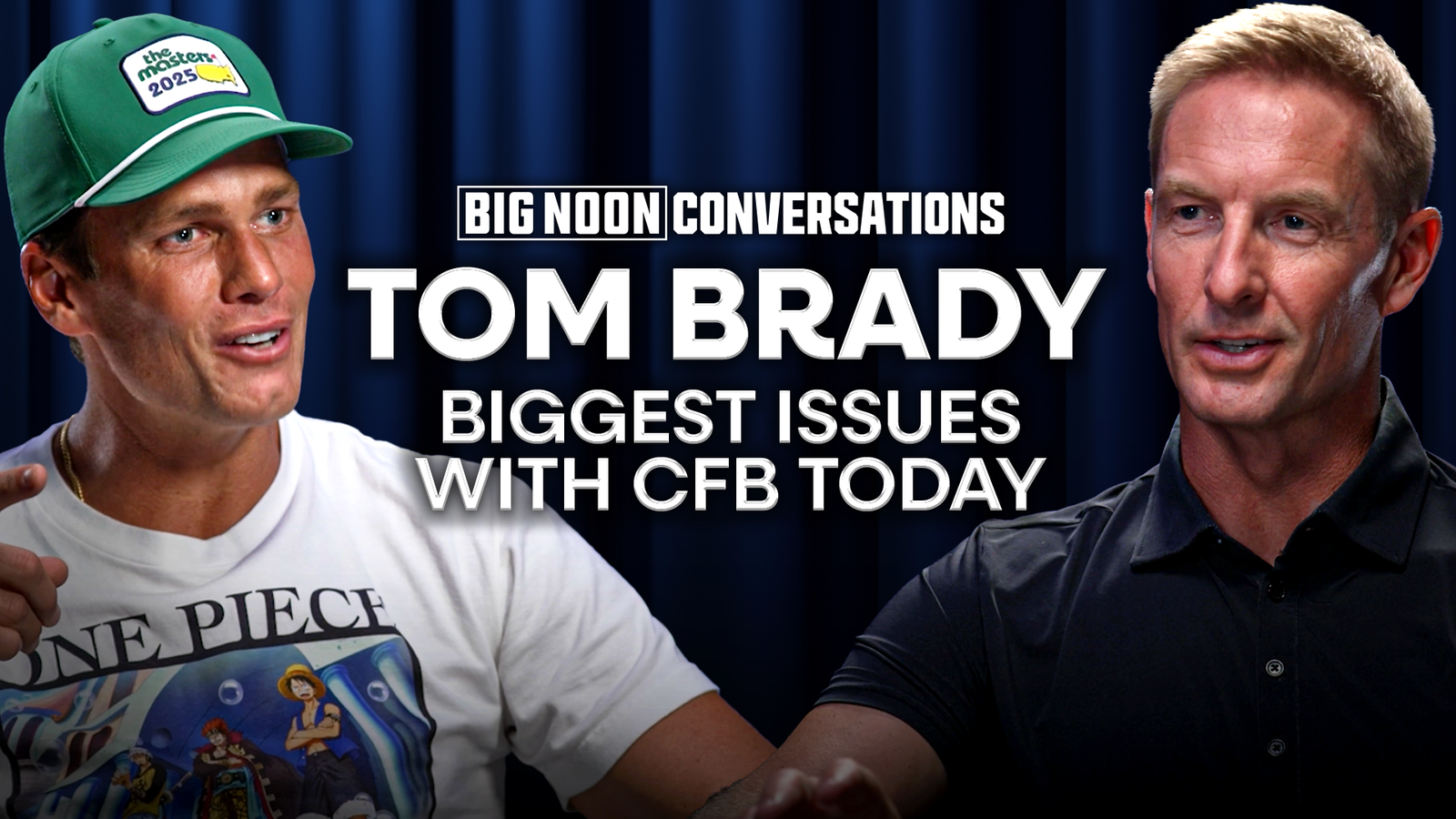Tom Brady looks at today’s college football landscape — flooded with transfers and NIL dollars — and wonders if a player like him would’ve stuck it out at Michigan. What he’s certain of, though, is that he’s not happy with where the college game is today.
In the most recent episode of “The Joel Klatt Show: Big Noon Conversations,” Brady didn’t have a direct answer when Klatt asked him if he would’ve remained in Ann Arbor for his entire college career had he played when name, image and likeness (NIL) and the transfer portal were around. But he’s grateful for what he had to go through at Michigan, while also questioning if college players today are willing to have a similar experience to what he went through.
“The only thing I can answer is to say that, based on what my experience was, I wouldn’t want it any other way than the way that I did it,” Brady said. “My college experience was very challenging. It was very competitive. Those traits transformed my life as a professional. I was ready to compete against anybody, because the competition in college toughened me up so much that I had a self-belief and self-confidence in myself that whatever I faced, I could overcome that.
“I think if we take that away from a young student athlete, to say, ‘You know what, I know, it’s tough to compete, but what we’re going to do before you have to compete, we’re actually going to put you somewhere else so that you don’t have to compete.’ That is absolutely the wrong thing to do to a young child.”
Brady’s path to becoming a starter at Michigan would’ve been pretty unconventional in this day and age. He was deep down on the depth chart his freshman season, getting redshirted, and still rode the bench in the following two years. Eventually, Brady became a starter in his fourth and fifth seasons. However, in his fifth year, he platooned with Drew Henson at quarterback for the first seven games.
While many players in similar situations have transferred in recent years, Brady didn’t place the blame on them. He instead challenged parents to instill resilience in their kids so they can battle through similar situations that he had to go through in college or later in life.
“They’re young. They don’t have life experience,” Brady said. “It should be the parents. Be a good parent. Teach your kid the right values. What’s going to sustain them in their careers over a period of time? Whether it’s football or whether it’s business or whether it’s teaching or law school or medical school or a trade, whatever you want to do, you’re going to have to go through hard things in your life. You’re going to have to make tough choices. The value isn’t always about the last dollar.
“So I think all these things that are happening in college sports, we’re prioritizing the wrong things. We’re valuing the wrong things. I’m not saying it’s not important. It’s one of 10 things that are important, and certainly to me, it’s not the most important. So when kids do go through that the right way, they’re actually learning the right values. When you have the right values in life, that’s going to sustain you as you move on through the rest of your life.”
[Read more from “Big Noon Conversations”: Marcus Freeman, Tony Petitti, Best of 2024 season]
When Brady committed to Michigan ahead of the 1995 season, he picked the Wolverines over UCLA, USC and Illinois, knowing that he had a tough climb ahead up the depth chart. However, Michigan was where he wanted to be because he “wanted to have a great college experience, go to school, have camaraderie with my teammates and compete at a high level,” adding that he was happy he “didn’t go to three different colleges.”
Brady is concerned that recruits and college players don’t share those same values he did when he was in his teens and younger 20s.
“The commercialization of what’s happened in college sports – I wonder whether many kids these days will learn those sustainable traits that I think are invaluable to their life and life experience. Are we doing them a disservice because we’re tempting them with some money in their pocket?” Brady said.
“It’s very intriguing to get that quick dollar. When I was in college, I got a $400 scholarship check. It seemed like I was rich. You know, it really did. I’m sure most kids felt like that. We got pizza cards to go to dinner, and we had a training table, and it was an amazing experience. We didn’t think about the money. These kids are such young ages. Their frontal lobes aren’t even fully developed yet, and now we’re tempting them with real-life, adult situations and their parents, and now they have agents. I’m sure it’s a very confusing time, and I’m sure a lot of parents are confused. I’m sure a lot of kids are confused, but because we’re just talking about money, money, money, money, like, that’s the only value in college. Is that what we’re saying? That, to me, [shows] the priorities are a bit messed up.”

Before becoming the most decorated quarterback in NFL history, Tom Brady battled for playing time at Michigan. (Photo by Damian Strohmeyer/Sports Illustrated via Getty Images)
Brady’s concerns with the college game go beyond off-field matters, too. When Klatt asked him what areas college coaches should focus on when developing quarterbacks, he bluntly replied, “I don’t think there is much development at this point.”
Brady added that there’s also a lack of development at the position in the NFL, but believes that there is a key part of a quarterback’s development that should take place in the college game.
“Physically, they’re developed, but the mental learning of how to study the game, learning the tactics, learning how to watch film, learning how to deal with the emotions of a competitive program, going up against a school rival, failing in front of 70,000 people. I think we’re lacking the mental and emotional development,” Brady said. “Physically, they may look developed. Mentally, emotionally, they’re very underdeveloped. Sometimes, their emotional growth is stunted by the fact that everybody is telling them how great they are all the time, or that it’s not their fault all the time.”
Thirty years after he first stepped foot on Michigan’s campus, Brady credits what he went through during his five years in Ann Arbor for helping him become the most decorated player in NFL history. The seven-time Super Bowl winner is calling on college players to be willing to go through what he went through, and for the biggest influences in their lives to encourage them to go through the struggle.
“When I got to the pro level, the only way that I could see us winning a championship was a group of men collectively coming together to try to accomplish this great goal,” Brady said. “It’s really freaking hard to do that. You need everybody invested in the success of the team. So, when you have those lessons, that is a very important structure for you to have. You got to be able to rely on your teammates. You have to be able to rely on your coaches. You have to develop the resilience within you because, as an athlete, as a broadcaster, whatever job you choose in life, you’re going to have to work your way up.
“The more you’re entitled to something, the less you’re actually going to learn about the reasons why you can become successful.”
Want great stories delivered right to your inbox? Create or log in to your FOX Sports account, follow leagues, teams and players to receive a personalized newsletter daily.
recommended

Get more from the College Football Follow your favorites to get information about games, news and more
Great Job & the Team @ FOX Sports Digital Source link for sharing this story.





